#Vishnu Gayatri Mantra
Explore tagged Tumblr posts
Video
youtube
Morning Vishnu Gayatri Mantra
Om Narayanaya Vidmahe | Narayan Gayatri Mantra With Lyrics | Vishnu Gaya...
2 notes
·
View notes
Text
Devuthani Ekadashi Mantr: देवउठनी एकादशी पर जरूर करें इन विशेष मंत्रों का जाप,मिलेगा बहुत लाभ - JeevanjaliDevuthani Ekadashi Mantr : देवउठनी एकादशी पर भगवान विष्णु की पूजा शुभ मुहूर्त को ध्यान में रखकर की जाती है। साथ ही इस पावन दिन भगवान विष्णु को योग निद्रा से जगाया जाता है।
#dev uthani ekadashi#devuthani ekadashi#dev uthani ekadashi kab hai#dev uthani ekadashi puja vidhi#ekadashi kab hai#vishnu mantra#vishnu#vishnu gayatri mantra#mangalam bhagwan vishnu#vishnu mantra 108Dharm News in Hindi#Dharm News in Hindi#Dharm Hindi News
0 notes
Text
Eternal Nature Of Gayatri Mantra
By KRISHNA ACHARYA BHATNAGAR

A human being’s most important and sacred duty is to remember God by singing His glory for all the bounties he has bestowed on humankind. For the Hindus, Vedic prayers are very sacred. Hymns of the Vedas are known as mantras. Some of the mantras are prayer-mantras. One such hymn in the Yajur Veda is the Gayatri mantra. It is a Beej mantra or seed syllable, derived from ancient primeval sounds.
The origin of the text of the Gayatri mantra has been elaborated in the Manu Smriti: “Brahma milked out, as it were, from the three Vedas or Rig Veda, Yajur Veda and Sama Veda, the letter ‘A’, the letter ‘U’ and the letter ‘M’ and formed by their coalition three monosyllables, together with three mysterious words — Bhur, Bhuvah and Svah or earth, sky and heaven”. Thus the text of the Gayatri mantra was composed as Om bhur bhuvah, svah, tat savitur varenyam bhargo devasya dheemahi dhiyo yo nah prachodayat. The mantra is conceived as the worship of Lord Hari, of Aditya or the Sun and also as pure Nirguna worship of Brahma.
Japa or chanting of this mantra with concentration and understanding, ushers in inexplicable mental peace, calm and solace. According to Agni Purana, the syllable ‘ja’ destroys the birth and death cycle and the syllable ‘pa’ destroys the sins. Thus japa of this mantra has the potential to unite the soul with the supreme being.
It has miraculous powers which can infuse us with courage and confidence. In the battle-field of Kurukshetra, in the Mahabharata Bhishma advises Yudhishthir to recite the ‘spiritually powerful’ Gayatri mantra. A wonderful miracle was witnessed when the late Swami Gitananda performed Guru Puja in Pondicherry. “The flower plates shook with powerful vibrations of the chanted mantras, and glasses of water shivered, bubbled and frothed”. In this mantra there is latent spiritual power which by regular japa and meditation can transform the mind into pragya or wisdom.
Lord Krishna says in the Bhagavad Gita, “Amongst the mantras I am Gayatri”. The Goddess Gayatri Devi is the incarnation and manifestation of Brahma, who resides in all living beings. The Gayatri mantra is also known as Savitri or Sun mantra. It is addressed to the divine power in the Sun.
The Svetasvatara Upanishad says, “The one affluent divinity is hidden in all beings. He is all-pervading and is the inner-self of all creatures. He presides over all actions and all beings reside in Him. He is the inner-witness. He endows all with consciousness and He is Nirguna or free from the three gunas”. Almost similar exposition of this mantra has been given in Isa Upanishad. However, the Rig Veda has defined this mantra from a different angle. “The illumined sages like Surya constantly see that infinite all-pervading supreme reality Vishnu without any obstruction as though their vast intuitive eye or vision was spread over the spiritual sky”.
All Vedic prayers have emerged from Om, which is synonymous with Brahma, and have ‘Om’ as prefix. “Om is a primeval sound. Exhaustive exposition of this mystic word has been given in Mandukya Upanishad. The gist of which is, “The word Om is this very soul that was in the past and all that would be in future. That which is beyond all this is also AUM”. Om represents all physical and astral bodies, both manifested and unmanifested, from the external most physical to the internal most spiritual core in their manifestation in four cosmic planes”.
Before recitation of the Gayatri mantra pranayama is immensely beneficial both for the mind and body. This helps in concentration. There is a very simple mechanism for this breathing exercise. Plug the right nostril by right hand thumb and then breathe deeply by left nostril as long as possible. Then exhale slowly through the right nostril. This exercise may be repeated as many times as possible.
Recitation of the Gayatri mantra, can be Vachik or chanting loudly, so that it is audible to listeners; Upansu or reciting in a very low voice and Mansik or mental chanting. The last one is most effective. Gayatri is a spiritual weapon which protects one who chants it, and blesses him with brilliant light of wisdom and spiritual illumination. Japa of the Gayatri mantra is a specially designed, efficient spiritual ritual for the realisation of the divinity of the self. It is nitya karma.
#Gayatri Mantra#Vedas#Hinduism#Spirituality#Meditation#Japa#Pranayama#Bhagavad Gita#Upanishads#Om#Savitri Mantra#Nirguna#Vishnu#Brahma#Kurukshetra#Mahabharata#Yudhishthir#Bhishma#Swami Gitananda#Mantra Chanting#Divine Wisdom#Eternal Self#Indian Philosophy#Sacred Hymns#Spiritual Practices#Mandukya Upanishad#Rig Veda#Yajur Veda#Sama Veda#Svetasvatara Upanishad
2 notes
·
View notes
Text


Surya "Aditya" Talon Abraxas Surya is known by many alternative names and epithets which include Vivasvat (Brilliant), Savitr (the Nourisher), Bhaskara (Light-maker), Dinakara (Day-maker), Lokacaksuh (Eye of the World), Graharaja (King of the Constellations), and Sahasra-kirana (Of a 1,000 rays). Vishnu, who later largely replaces Surya's function in the Hindu pantheon, is referred to as Surya-Narayana in his incarnation as the sun. Surya Gayatri Mantra: “Om Bhaskaray Vidmahe Martanday Dheemahi Tanah Surya Prachodayat”
37 notes
·
View notes
Text
I LOVE Religious memes, and I'll tell you exactly why:
Muslim Memes
I have come across so many memes on Muslim life and they are so. Funny.




And an honourable mention to the guy who left the Mufti flaberstaged by slipping and eating Shawarma with Tahini, 3 slices of apple and a wholeass litre of water 😭😭
Muslims are careful not to make God and any religious figure a part of their humour but the jokes surrounding their lifestyle are hilarious. I laugh everytime I see that shiekh with the telescope. And the pettiness of the youtube channel, I'm crying😂😂
I really love the sense of humour and its so relatable sometimes that I just cannot–
(I could not put those relatable memes here because of this app's cursed limit, but It's about stuff like praying fast to do other stuff as a kid which reminded me of speeding through Gayatri Mantra and putting Zam Zam, which is Muslim version of Gangajal in your eyes to purify them)
There are so, so many great memes better than the ones I just posted but my stupid ass pinterest lost them at the right time so yay? 🙃
Rating this a solid 786/10
Christian Memes
Studying in a convent (and their not so subtle indocrination of the faith in us) has made me have a fair bit of acquaintance with this religion.
I see that the case is somewhat more towards making jokes on the bible lore itself. Like yeah there is content on Christian life but jokes on Jesus, apostles and New testemant are the ones I come across more frequently and I LOVE them?? They are so unabashedly hilarious😭😭



Gotta look paintable, even if it's your last dinner, am I right?
I Hollered at the cross one (yes, I studied in a Catholic school and I know exactly what the prominence of the cross is, but I love a sarcastic Jesus omg😭)
I know everytime I come across a Christian TikTok, either about Christian life or Bible lore, I'm ensured of a chuckle atleast.
Rating these a 12/3 for my man Moses
Hindu Memes
Now, the thing with us is that we are free to make jokes on either the lore and our life, because God has made sure to let us know that he has a good sense of humour *cough cough* Vishnu Ji trolling demons with Bramha ka Vardaan *cough* , but I see that we too have more memes on lore than life style.
And THESE are the ones thar speak loudest to me of them all, partially because I'm a Hindu and they hit close to home and partially because they are the best thing ever??😭😭
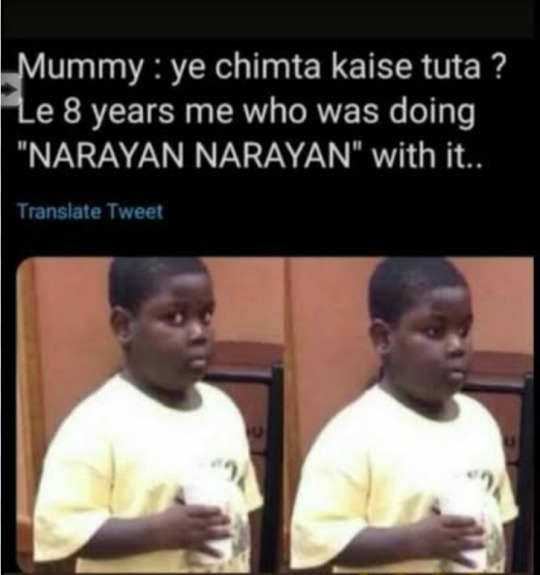


I have an entire collection of these and they are hilarious, the kind that make you holler if you understand the lore.
The thing is, while there's 10/10 stuff in the lore section, I really feel the lack of memes when it comes to humour on Hindu life, so I hope we can make more of that.
Rating 1008/10 because ofcourse.
All in all, I have two things to say:
1) we need more hindu life memes, let's make them.
2) SEND ME YOUR RELIGIOUS MEMES
#hindublr#desiblr#hindu memes#muslim memes#islamic memes#christian memes#religious memes#religious humour#humour
39 notes
·
View notes
Text
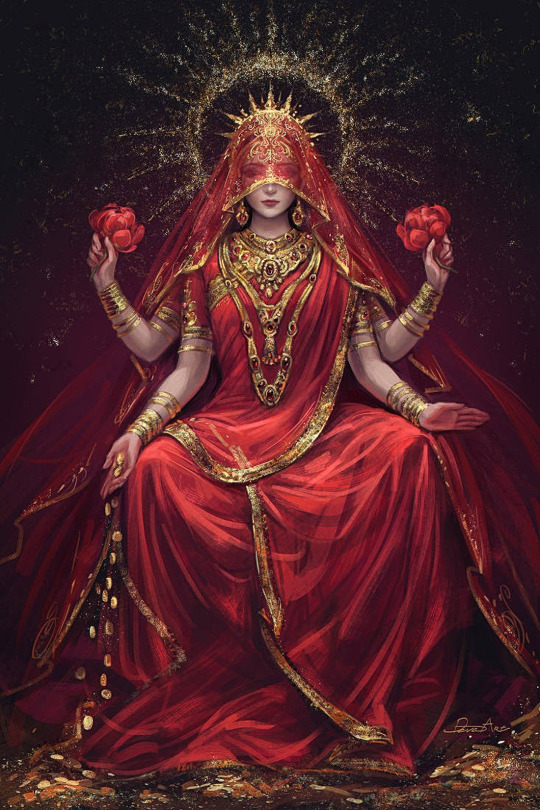
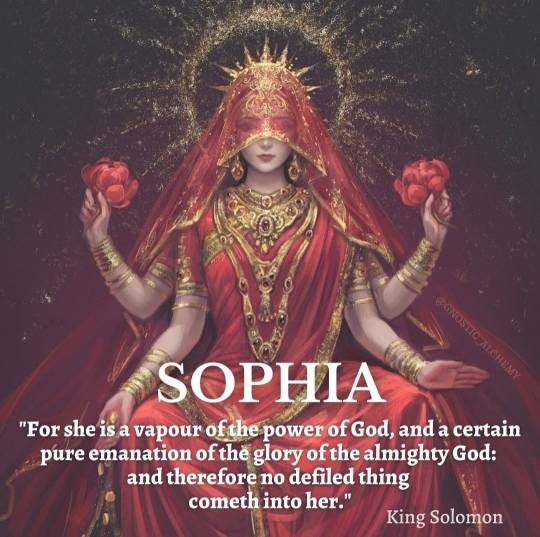
Goddess Lakshmi is the ruler of wealth, riches, abundance and desire fulfillment. Meditate on the Lakshmi mantra to invoke Lakshmi's blessings in order to attain your life purpose and gain fulfillment in life
Maha Lakshmi Mantra :
"Om Shreem Hreem Shreem Kamale Kamalalaye Praseed Praseed Shreem Hreem Shreem
Om Mahalakshmaye Namah"
Lakshmi Gayatri Mantra :
Om Mahalaxmiyei Vidmahe
Vishnu Patniyai cha Dhimahi
Tanno Lakshmih Prachodayat.
Lakshmi Gayatri Mantra Meaning :
Om, Let me meditate on the greatest goddess, Who is the wife of Lord Vishnu, Give me higher intellect, And let Goddess give the wealth and prosperity.
Goddess Lakshmi art by Develv
20 notes
·
View notes
Text
Gayatri Mantras for different Deities
According to Vedas there is only one prayer/mantra which should be recited - it is known as the Gāyatri Mantra.
Oṃ bhūr bhuvaḥ suvaḥ |
Tat savitur vareṇyaṃ |
Bhargo devasya dhīmahi |
dhīyo yo naḥ pracodayāt ||
Which means:-
“We meditate upon the Adorable Light (i.e. the Sun) of the Supreme Being who has projected this entire universe into being. May That One impel our minds towards enlightenment.”
Variant readings:
May That One enlighten our intellects.
May That One guide our mind, speech and actions.
This is the Vedic version, but there are hundreds of other versions pertaining to each and every aspect of the Supreme Being - for the sake of the devotees who prefer NAME and FORM (nāma-rūpa).
Some of these alternative Gāyatris are found in the Upaniṣads (Mahā Nārāyaṇa Upaṇiṣad) but most are from the Tantras.
So if you are a devotee of any particular deity you may choose the gāyatri of that Deity and repeat and meditate upon it only.
Guru
ॐ गुरु-देवाय विद्महे । पर-ब्रह्माय धीमहि । तन्नो गुरुः प्रचोदयात् ॥
oṁ guru-devāya vidmahe | para-brahmāya dhīmahi | tanno guruḥ pracodayāt ||
1. Brahma
ॐ वेदात्मनाय विद्महे । हिरण्य-गर्भाय धीमहि । तन्नो ब्रह्म प्रचोदयात् ॥
oṁ vedātmanāya vidmahe | hiraṇya-garbhāya dhīmahi | tanno brahma pracodayāt ||
May we know the Spirit of the Vedas, let us contemplate the Creator of the Universe; may that Great One enlighten our intellects.
2. Viṣṇu
ॐ नारायणाय विद्महे । वासुदेवाय धीमहि । तन्नो विष्णु प्रचोदयात् ॥
oṁ nārāyaṇāya vidmahe | vāsudevāya dhīmahi | tanno viṣṇu pracodayāt ||
May we know the Cause-of-all-beings, let us contemplate the Indweller-of-all-jivas; may that Supreme Omnipresent one enlighten our intellects.
ॐ विश्वरूपाया विद्महे । विश्वातीताय धिमहि । तन्नो विष्णु प्रचोदयात् ॥
oṁ viśvarūpāyā vidmahe | viśvātītāya dhimahi | tanno viṣṇu pracodayāt ||
3. Śiva
ॐ तत्पुरुषाय विद्महे । महादेवाय धीमहि । तन्नो रुद्र प्रचोदयात् ॥
oṁ tatpuruṣāya vidmahe | mahādevāya dhīmahi | tanno rudra pracodayāt ||
May we know that Supreme Person, let us contemplate the Great God; may Lord Siva enlighten our intellects.
4. Gaṇeśa
ॐ एकदन्ताय विद्महे । वक्रतुण्डाय धीमहि । तन्नो दन्ति प्रचोदयात् ॥
oṁ ekadantāya vidmahe | vakratuṇḍāya dhīmahi | tanno danti pracodayāt ||
May we know that Supreme Person, let us contemplate the elephant-faced One; may that Great Tusker enlighten our intellects.
5. Subrahmaṇyā
ॐ तत् पुरुषाय विद्महे । महासेनाय धीमहि । तन्न षण्-मुख प्रचोदयात् ॥
oṁ tat puruṣāya vidmahe | mahāsenāya dhīmahi | tanna ṣaṇ-mukha pracodayāt ||
May we know that Supreme Person, let us contemplate that Great Warrior; may that Six-faced One enlighten our intellects.
6. Durgā
ॐ कात्यायनाय विद्महे । कन्य-कुमारि धीमहि । तन्नो दुर्गि प्रचोदयात् ॥
oṁ kātyāyanāya vidmahe | kanya-kumāri dhīmahi | tanno durgi pracodayāt ||
May we know Katyayani, We meditate upon the Virgin Goddess, may she enlighten our intellects.
7. Lakṣmī
ॐ महादेव्यै च विद्महे । विष्णु पत्न्यै च धीमहि । तन्नो लक्ष्मी प्रचोदयात् ॥
oṁ mahādevyai ca vidmahe | viṣṇu patnyai ca dhīmahi | tanno lakṣmī pracodayāt ||
May we know the great Goddess, we meditate upon the consort of Vishnu, may Lakshmi enlighten our intellects.
8. Sarasvatī
ॐ वाग्देव्यै च विद्महे । ब्रह्म-पत्न्यै च धीमहि । तन्नो वाणी प्रचोदयात् ॥
oṁ vāgdevyai ca vidmahe | brahma-patnyai ca dhīmahi | tanno vāṇī pracodayāt ||
May we know the Goddess of speech, we meditate upon the consort of Brahma, may Speech enlighten our intellects.
#gayatri mantra#mantra#vedic mantra#vedic astrology#vedas#Vedic Jyotish Online#vedic astro observations#astrology numerology vedicastrology#vedic astro notes#astrology numerology vedicastrology#vedi#spiritual enlightment#spirituality#spiritual development#spiritualawakening#enlightenment#enlightenyourself#enlightenedconsciousness#enlightenedbeings
18 notes
·
View notes
Text
The Power of Vedic Chants & Mantras in Garbh Sanskar
Garbh Sanskar, an ancient Indian practice, emphasizes the spiritual, mental, and physical well-being of both the mother and the baby in the womb. Among its many aspects, Vedic chants and mantras play a crucial role in fostering positive vibrations, enhancing fetal development, and creating a peaceful environment for the unborn child.
Scientific studies suggest that sound waves, particularly rhythmic and harmonious sounds, can positively influence fetal brain development. Chanting specific Vedic mantras in Garbh Sanskar in pregnancy can help in reducing stress, promoting emotional balance, and ensuring holistic development for the baby.
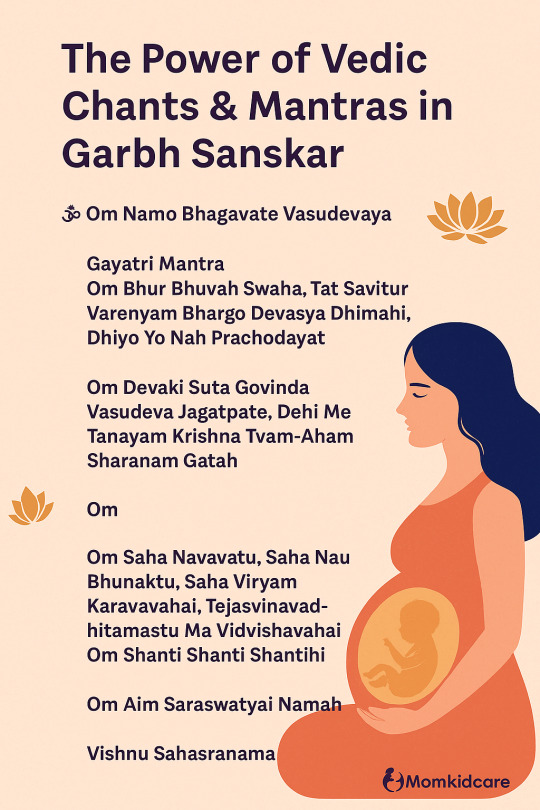
Why Are Mantras Important in Garbh Sanskar?
Mantras are powerful sound vibrations that create a harmonious environment in the mother’s womb. The benefits include:
✔️ Calmness & Emotional Stability: Helps the mother maintain a stress-free pregnancy.
✔️ Brain Development: The rhythmic vibrations stimulate cognitive growth in the fetus.
✔️ Spiritual Growth: The child absorbs positive energies,leading to a balanced personality.
✔️ Better Bonding: Chanting strengthens the mother-baby connection even before birth.
List of Essential Mantras for Garbh Sanskar
In Garbh Sanskar, Vedic mantras play a vital role in creating a positive and nurturing environment for both the mother and the baby. These sacred chants are believed to enhance the baby’s mental, emotional, and spiritual development while promoting peace and relaxation for the mother. Each mantra carries unique vibrations that can help in reducing stress, improving focus, and fostering a deep connection between the mother and her unborn child. Regular chanting or listening to these mantras can bring harmony, protection, and divine blessings throughout the pregnancy.
1. Garbha Raksha Mantra (For Protection & Growth)
🕉 Om Namo Bhagavate Vasudevaya
(ॐ नमो भगवते वासुदेवाय)
✔️ Ensures protection and well-being of the baby.
2. Gayatri Mantra (For Intelligence & Wisdom)
🕉 Om Bhur Bhuvah Swaha, Tat Savitur Varenyam Bhargo Devasya Dhīmahi, Dhiyo Yo Nah Prachodayāt
(ॐ भूर् भुवः स्वः तत्सवितुर्वरेण्यम्। भर्गो देवस्य धीमहि। धियो यो नः प्रचोदयात्॥)
✔️ Enhances mental abilities and spiritual growth of the child.
3. Santana Gopala Mantra (For a Healthy & Divine Baby)
🕉 Om Devaki Suta Govinda Vasudeva Jagatpate, Dehi Me Tanayam Krishna Tvam-Aham Sharanam Gatah
(ॐ देवकी सु�� गोविन्द वासुदेव जगत्पते। देहि मे तनयं कृष्ण त्वामहं शरणं गतः॥)
✔️ Invokes Lord Krishna’s blessings for a healthy baby.
4. Omkar Mantra (For Positive Energy & Healing)
🕉 Om
(ॐ)
✔️ The primordial sound that balances the mind, body, and spirit.
5. Shanti Mantra (For Peace & Harmony)
🕉 Om Saha Navavatu, Saha Nau Bhunaktu, Saha Viryam Karavavahai, Tejasvinavadhitamastu Ma Vidvishavahai, Om Shanti Shanti Shantihi
(ॐ सह नाववतु। सह नौ भुनक्तु। सह वीर्यं करवावहै। तेजस्विनावधीतमस्तु मा विद्विषावहै॥)
✔️ Brings harmony and removes negative energies.
6. Saraswati Vandana (For Knowledge & Learning)
🕉 Om Aim Saraswatyai Namah
(ॐ ऐं सरस्वत्यै नमः)
✔️ Encourages wisdom, intelligence, and learning.
7. Vishnu Sahasranama (For Divine Protection)
🕉 Reciting Lord Vishnu’s 1000 names ensures blessings, longevity, and positive energy.
Vedic mantras in Garbh Sanskar online classes are not just sounds but powerful vibrations that shape the baby’s intellect, emotions, and spiritual well-being. Integrating these sacred chants into daily practice can ensure a blissful pregnancy and a positive environment for both the mother and child.
0 notes
Text
Remedies for Planetary Afflictions in Your Birth Chart
Introduction
In astrology, the planetary placements in your birth chart influence various aspects of your life, including career, relationships, health, and overall well-being. However, certain planetary afflictions, such as weak or malefic planetary positions, retrograde planets, or planetary conjunctions with malefic influences, can bring challenges and obstacles. Fortunately, astrology provides powerful remedies to mitigate these negative effects and harmonize planetary energies. In this blog, we will explore effective remedies for planetary afflictions and how they can help restore balance in your life.
Also read - Exploring Ancient Wisdom of Vedic Astrology and Palmistry
Remedies for Each Planet
1. Sun (Surya) Affliction
Worship Lord Surya by offering water to the Sun every morning while chanting the Gayatri Mantra.
Wear a ruby gemstone set in gold on your ring finger after consulting an astrologer.
Recite the Aditya Hridaya Stotra to strengthen the Sun’s influence.
Observe fasts on Sundays and donate wheat, jaggery, and red clothing to the needy.
2. Moon (Chandra) Affliction
Recite the Maha Mrityunjaya Mantra or the Chandra Beej Mantra regularly.
Wear a natural pearl in silver on the little finger of your right hand.
Fasting on Mondays and offering white foods like rice, sugar, and milk to charity can be beneficial.
Worship Lord Shiva and perform Rudrabhishek for mental peace.
Chat here: Chat with astrologer online
3. Mars (Mangal) Affliction
Chant the Hanuman Chalisa and worship Lord Hanuman regularly.
Wear a red coral gemstone in copper or gold after an astrological recommendation.
Observe fasts on Tuesdays and donate red lentils, jaggery, and red clothes.
Avoid anger and aggression; practice yoga and meditation to balance Mars' fiery energy.
4. Mercury (Budh) Affliction
Recite the Budh Beej Mantra or Vishnu Sahasranama for strengthening Mercury.
Wear an emerald gemstone in a gold or silver ring.
Keep a green cloth or green items like whole moong dal, spinach, and green fruits in your diet.
Feed cows with green fodder and support students in their education.
5. Jupiter (Guru) Affliction
Chant the Guru Beej Mantra or Vishnu Mantra daily.
Wear a yellow sapphire gemstone in gold after an astrologer’s advice.
Donate yellow items like turmeric, bananas, and yellow clothes on Thursdays.
Worship Lord Vishnu and practice acts of kindness and charity.
6. Venus (Shukra) Affliction
Recite the Shukra Beej Mantra and worship Goddess Lakshmi.
Wear a white sapphire or diamond in silver or platinum.
Keep fresh flowers at home and use fragrances to enhance positive Venusian energy.
Donate white sweets, rice, and curd on Fridays.
7. Saturn (Shani) Affliction
Chant the Shani Mantra and Hanuman Chalisa regularly.
Wear a blue sapphire gemstone only after expert consultation.
Perform Shani Daan (charity) by donating black sesame seeds, mustard oil, and black clothes on Saturdays.
Help the underprivileged and feed crows or stray dogs.
8. Rahu Affliction
Chant the Rahu Beej Mantra and Durga Saptashati.
Wear a hessonite garnet in silver after astrological consultation.
Avoid addictions, deception, and unethical activities.
Donate dark blue or black-colored items and keep a silver square piece in your wallet.
9. Ketu Affliction
Chant the Ketu Beej Mantra and worship Lord Ganesha.
Wear a cat’s eye gemstone after consultation.
Keep a pet dog and feed stray dogs regularly.
Donate black and white blankets, sesame seeds, and bananas.
Conclusion
Planetary afflictions in the birth chart can create hurdles in different aspects of life, but with the right astrological remedies, one can overcome these challenges. Whether through mantra chanting, fasting, gemstone therapy, or acts of charity, aligning with planetary energies helps restore balance and bring positive transformations. Always consult a knowledgeable astrologer before performing any remedy to ensure it aligns with your unique astrological chart. By applying these time-tested remedies, you can enhance the positive influences of planets and lead a more harmonious and prosperous life.
Have any questions? Speak with an astrologer: Download the App Now
0 notes
Text
The Role of Mantras in Hindu Poojas: Unlocking Divine Energy
Mantras are the soul of Hindu poojas, serving as a bridge between the devotee and the divine. These sacred sounds, often composed in Sanskrit, are believed to carry spiritual vibrations that purify the mind, body, and environment. Whether it’s a simple daily ritual or an elaborate ceremony, mantras play a pivotal role in enhancing the spiritual experience. In this blog, we delve into the role of mantras in Hindu poojas, their significance, and how they transform ordinary rituals into profound spiritual practices.
1. What are Mantras?
The word mantra is derived from two Sanskrit words: “man” (mind) and “tra” (tool), meaning “a tool for the mind.” Mantras are sacred phrases, sounds, or syllables that are repeated during poojas to invoke divine energies. They are often revealed to ancient sages during deep meditation and are considered the sound forms of divine consciousness.
Mantras are not just words; they are vibrations that resonate with cosmic energies, creating a powerful spiritual impact.
2. Significance of Mantras in Poojas
Mantras hold immense significance in Hindu poojas for the following reasons:
Invocation of Deities: Mantras are used to call upon the presence of deities and seek their blessings.
Purification: The vibrations of mantras cleanse the environment and the minds of devotees, removing negative energies.
Focus and Concentration: Chanting mantras helps calm the mind, eliminate distractions, and deepen concentration.
Spiritual Connection: Mantras create a direct link between the devotee and the divine, fostering a sense of unity and devotion.
Manifestation of Desires: Specific mantras are chanted to fulfill particular desires, such as health, wealth, or success.
3. Types of Mantras Used in Poojas
Different mantras are used for different purposes during poojas. Here are some common types:
Beej Mantras: These are single-syllable mantras that represent the essence of a deity. For example:
Om Gam Ganapataye Namah (for Lord Ganesha).
Om Namah Shivaya (for Lord Shiva).
Vedic Mantras: These are verses from the Vedas, often used in elaborate rituals like yagnas and havanas. For example:
Gayatri Mantra: A universal mantra for wisdom and enlightenment.
Stotras and Slokas: These are hymns or prayers dedicated to specific deities. For example:
Vishnu Sahasranama (1000 names of Lord Vishnu).
Shiva Tandava Stotram (in praise of Lord Shiva).
Aarti Mantras: These are sung during the aarti ceremony to express devotion and gratitude.
4. How Mantras Enhance Poojas
Mantras elevate the spiritual experience of poojas in the following ways:
Creating a Sacred Atmosphere: The vibrations of mantras purify the environment and create a spiritually charged atmosphere.
Amplifying Devotion: Chanting mantras with sincerity deepens the devotee’s connection with the divine.
Focusing the Mind: Mantras help calm the mind and eliminate distractions, allowing devotees to fully immerse themselves in the ritual.
Attracting Divine Blessings: The energy of mantras attracts the attention of deities and invokes their blessings.
5. Common Mantras for Popular Poojas
Here are some commonly chanted mantras for popular poojas:
Ganpati Pooja:
Om Gam Ganapataye Namah (for success and removing obstacles).
Lakshmi Pooja:
Om Shreem Mahalakshmiyei Namah (for wealth and prosperity).
Shiva Pooja:
Om Namah Shivaya (for peace and liberation).
Durga Pooja:
Om Dum Durgayei Namah (for protection and strength).
Satyanarayan Pooja:
Om Namo Bhagavate Vasudevaya (for happiness and harmony).
6. Tips for Chanting Mantras Effectively
To get the most out of mantra chanting during poojas, follow these tips:
Pronunciation: Ensure correct pronunciation to maintain the purity of the mantra.
Focus: Chant with full concentration and devotion.
Repetition: Repeat the mantra multiple times to deepen its impact.
Intention: Chant with a clear intention or sankalpa (resolution).
Environment: Choose a clean and quiet place for chanting.
How Book My Pooja Can Help You
At Book My Pooja, we understand the importance of mantras in enhancing the spiritual experience of poojas. Our platform connects you with experienced priests who are well-versed in Vedic mantras and rituals. Whether you’re planning a simple daily pooja or an elaborate ceremony, we ensure that the mantras are chanted correctly and with devotion.
With Book My Pooja, you can:
Get personalized guidance on the right mantras for your pooja.
Book experienced priests to perform the rituals with precision.
Access doorstep delivery of all essential pooja samagri.
Let us help you create a spiritually enriching experience with the power of mantras.
Conclusion
Mantras are the heart and soul of Hindu poojas, serving as a powerful tool to connect with the divine. Their vibrations purify the mind, body, and environment, creating a sacred atmosphere for spiritual growth. By chanting mantras with sincerity and devotion, you can enhance the effectiveness of your poojas and attract divine blessings.
With Book My Pooja, you can simplify the process and ensure that your poojas are conducted with authenticity and precision. Let us help you make your next pooja a truly special and spiritually uplifting experience.
0 notes
Text
What is Janeu in Hinduism?
Introduction
Hinduism is a religion deeply rooted in rituals, traditions, and spiritual practices. Among the many sacred rites performed in a Hindu's lifetime, Janeu (Yajnopavita) holds a significant place. The Janeu is a sacred thread worn by Hindu males, primarily belonging to the Brahmin, Kshatriya, and Vaishya castes, as a symbol of their commitment to spiritual knowledge and responsibility.
This article explores the meaning, significance, rituals, benefits, and historical relevance of Janeu in Hinduism.

What is Janeu?
Janeu, also known as Yajnopavita or Upanayana thread, is a sacred white cotton thread worn diagonally across the body, over the left shoulder and under the right arm. It symbolizes the spiritual rebirth of the individual and their readiness to embark on the journey of learning sacred scriptures and leading a disciplined life.
Types of Janeu Threads
The Janeu thread varies based on caste and marital status:
Brahmin Janeu – Three strands representing Brahma, Vishnu, and Mahesh.
Kshatriya Janeu – Three strands symbolizing strength, courage, and duty.
Vaishya Janeu – Three strands denoting wealth, prosperity, and trade.
Married Men Janeu – Six strands (doubled thread) after marriage.
Significance of Janeu in Hinduism
The Janeu thread is not just a piece of cloth but a representation of deep spiritual and moral values.
Spiritual Growth – Wearing Janeu marks the initiation of a boy into Vedic learning, making him eligible for spiritual education.
Symbol of Responsibility – It signifies the acceptance of duties towards God, society, and ancestors.
Connection with the Guru – The Upanayana ceremony (Janeu Sanskar) is often conducted by a guru, reinforcing the student’s dedication to wisdom.
Three Strands’ Meaning – The three strands of the thread symbolize the three debts (Rin) a person must pay:
Deva Rin (debt to Gods)
Rishi Rin (debt to sages and teachers)
Pitra Rin (debt to ancestors)
Represents Purity – The sacred thread reminds the wearer to lead a disciplined, pure, and righteous life.
Janeu Sanskar: The Sacred Thread Ceremony
Age and Eligibility
The Upanayana Sanskar is traditionally performed at the following ages:
Brahmins – 8 years
Kshatriyas – 11 years
Vaishyas – 12-16 years However, it can also be performed later if missed during childhood.
Rituals of the Janeu Ceremony
Ganesh Puja – Worshiping Lord Ganesha for obstacle-free rituals.
Karma Shuddhi – Cleansing of sins through sacred prayers.
Havan (Sacred Fire Ceremony) – Offerings are made to the fire to seek divine blessings.
Guru Diksha (Initiation by Guru) – The guru whispers the Gayatri Mantra into the boy’s ear, marking the start of his spiritual journey.
Wearing the Janeu – The sacred thread is placed across the boy’s body, signifying his new role in society.
(Image placeholder: A young boy receiving Janeu in a traditional Upanayana ceremony)
Rules & Discipline After Wearing Janeu
Once a person wears Janeu, they must follow certain spiritual and lifestyle disciplines:
Daily Chanting of Gayatri Mantra – It helps purify the mind and soul.
Following Brahmacharya (Celibacy & Discipline) – A commitment to self-control and purity.
Performing Sandhya Vandana – A daily prayer to the Sun God (Surya Dev).
Avoiding Tamasic Food – Refraining from non-vegetarian food and intoxicants.
Conducting Rituals Properly – Respecting religious duties and obligations.
Benefits of Wearing Janeu
Spiritual Benefits
Enhances focus, self-discipline, and commitment to dharma.
Strengthens the connection with divine energies and ancient wisdom.
Acts as a protective shield against negative influences.
Health Benefits
The position of the thread across the left shoulder aligns with acupressure points, improving blood circulation.
It is believed to regulate bodily energies and support mental well-being.
The recitation of Gayatri Mantra is known to have calming effects on the mind.
Scientific Perspective on Janeu
Modern science has found interesting benefits associated with wearing the Janeu thread:
The placement of the thread on the left shoulder is believed to have an impact on the nervous system, helping in better control of emotions.
It is said to aid in digestion and relieve acidity issues when placed over the ear during urination, as per Ayurveda.
The chanting of Gayatri Mantra during daily rituals is proven to enhance cognitive functions and brain activity.
(Image placeholder: A priest tying Janeu during the ceremony)
Changing the Janeu: When and How?
The sacred thread is not worn permanently; it must be changed under certain conditions:
If it breaks due to wear and tear.
After performing Shraddha Karma (rituals for ancestors).
If it becomes impure (e.g., due to touching inauspicious substances like meat or alcohol).
During new moon days (Amavasya) as a spiritual renewal practice.
To replace it, a priest or the wearer himself performs a simple Sankalpa (sacred intention) prayer, followed by placing the new Janeu thread while chanting Vedic mantras.
Janeu in Different Hindu Traditions
South Indian Tradition: The ceremony is called Munji and involves more extensive rituals.
North Indian Tradition: It is mostly conducted with Gayatri Mantra initiation.
Maharashtrian Tradition: The Janeu ceremony is often performed alongside marriage rituals.
Bengali Tradition: In Bengal, it is less common, but Brahmin families still practice it.
Common Myths & Misconceptions About Janeu
Only Brahmins Can Wear Janeu – While it is commonly associated with Brahmins, Kshatriyas and Vaishyas also undergo this ceremony.
Janeu is Only a Religious Symbol – It also has scientific and spiritual significance.
Women Cannot Wear Janeu – In ancient times, women were also allowed to wear Janeu if they pursued Vedic studies.
(Image placeholder: A group of boys undergoing the Janeu ceremony together)
Conclusion
Janeu, or the sacred thread, is not just a piece of thread but a symbol of responsibility, spirituality, and discipline in Hinduism. It marks the transition from childhood to a more responsible phase of life, where an individual commits to learning, self-discipline, and devotion to dharma.
The tradition of Janeu continues to hold great importance in Hindu society, preserving ancient wisdom and connecting generations with their spiritual roots.
Frequently Asked Questions (FAQs)
Can a non-Hindu wear Janeu?
No, Janeu is specifically for those initiated into Hinduism’s Vedic traditions.
What happens if Janeu is broken?
A new one must be worn with proper rituals.
Can Janeu be worn during sleep?
Yes, but it should be kept clean and untangled.
Why do some people wear multiple Janeu threads?
Married men or those who perform higher rituals may wear additional strands.
(Image placeholder: A sacred Hindu temple where Janeu ceremonies are conducted)
Share Your Thoughts
Did you find this article helpful? Feel free to comment and share your experiences with Janeu Sanskar!
Presented by Talkndheal
1 note
·
View note
Audio
Listen/purchase: Vishnu Gayatri Mantra: The Great Sustainer of the Universe by Music for Deep Meditation & Vidura Barrios
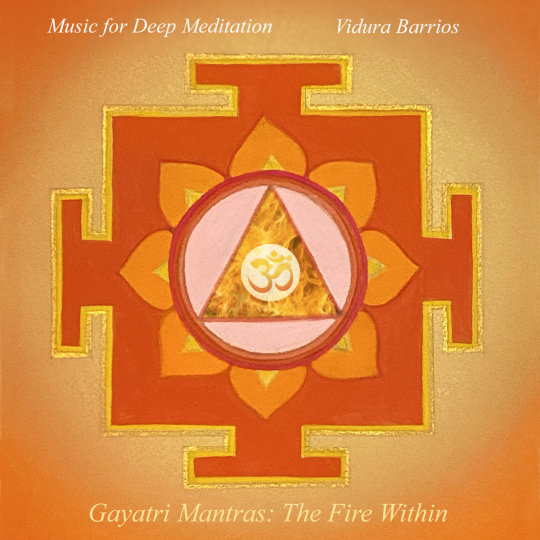
Vishnu Gayatri Mantra: The Great Sustainer of the Universe ~from Gayatri Mantras: The Fire Within by Music for Deep Meditation & Vidura Barrios
1 note
·
View note
Text
Remedies for Jupiter in All Houses as per Lal Kitab

Jupiter (Guru) is a benefic planet in Vedic astrology associated with wisdom, prosperity, spirituality, education, and good fortune. Its placement in the birth chart influences a person’s moral values, wealth, and relationships with elders. Remedies for Jupiter in Lal Kitab focus on strengthening its positive effects and reducing challenges in various aspects of life.
Here’s a detailed guide to remedies for Jupiter in all 12 houses:
1st House (Ascendant)
Effects: Jupiter in the 1st house blesses the native with wisdom, spiritual inclination, and a positive personality. However, if afflicted, it can lead to arrogance, weight issues, or lack of focus.
Remedies:
Wear a yellow sapphire (after consulting an astrologer).
Donate turmeric, yellow clothes, or sweets on Thursdays.
Avoid consumption of alcohol and non-vegetarian food.
Apply a small tilak of turmeric or sandalwood on your forehead daily.
2nd House
Effects: Jupiter in the 2nd house promotes wealth, speech, and family harmony. However, it may cause financial instability or conflicts in the family if afflicted.
Remedies:
Keep a yellow cloth or gold coin in your locker for financial stability.
Avoid speaking lies or indulging in arguments.
Feed cows with jaggery and gram on Thursdays.
Recite the Guru Beej Mantra: “Om Graam Greem Graum Sah Gurave Namah”.
3rd House
Effects: Jupiter in the 3rd house enhances communication skills, courage, and relationships with siblings. However, it may lead to laziness or a lack of initiative.
Remedies:
Respect and serve elders, especially teachers and mentors.
Donate yellow fruits or lentils to the needy on Thursdays.
Avoid criticizing others or being overconfident.
Wear a yellow thread or keep a piece of gold close to your body.
4th House
Effects: Jupiter in the 4th house affects domestic happiness, relationships with the mother, and property matters. A weak Jupiter may create financial instability or emotional disturbances.
Remedies:
Offer yellow flowers or turmeric to Lord Vishnu on Thursdays.
Avoid conflicts or arguments with your mother.
Keep a yellow handkerchief or cloth in your pocket.
Donate yellow food items like bananas or sweets to the poor.
5th House
Effects: Jupiter in the 5th house enhances intelligence, creativity, and relationships with children. If afflicted, it may cause delays in childbirth or instability in decision-making.
Remedies:
Chant the Guru Gayatri Mantra: “Om Brihaspataye Vidmahe Divyadehaya Dhimahi Tanno Guru Prachodayat”.
Avoid gambling or speculative activities.
Light a diya (lamp) of ghee in the northeast corner of your home.
Donate yellow clothes or books to children or students.
6th House
Effects: Jupiter in the 6th house strengthens the native to overcome enemies and challenges. However, it may lead to health issues related to the liver, obesity, or overindulgence.
Remedies:
Offer water mixed with turmeric to a Peepal tree on Thursdays.
Avoid egoistic behavior and practice humility.
Donate yellow sweets or turmeric to the needy.
Meditate regularly to maintain emotional balance.
7th House
Effects: Jupiter in the 7th house influences marital harmony and partnerships. If afflicted, it may cause delays in marriage, ego clashes, or difficulties in partnerships.
Remedies:
Respect your spouse and avoid ego battles.
Wear gold jewelry or keep a piece of gold close to your body.
Offer yellow flowers to Lord Vishnu or Guru Brihaspati on Thursdays.
Avoid taking or giving dowry in marriage.
8th House
Effects: Jupiter in the 8th house impacts longevity, hidden wisdom, and sudden transformations. A weak Jupiter may lead to health issues or unexpected financial troubles.
Remedies:
Donate yellow fruits, gold, or turmeric to a temple.
Avoid consuming alcohol or other intoxicants.
Chant the Guru Beej Mantra daily for protection and prosperity.
Feed cows with jaggery and gram on Thursdays.
9th House
Effects: Jupiter in the 9th house is a highly auspicious placement that enhances luck, spiritual growth, and higher learning. If afflicted, it may cause a lack of faith or conflicts with father figures.
Remedies:
Worship Lord Vishnu regularly and offer yellow flowers or sweets.
Respect your father and other elders.
Donate yellow items, such as turmeric, bananas, or gold, on Thursdays.
Wear a gold chain or a yellow sapphire (after consultation).
10th House
Effects: Jupiter in the 10th house influences career, reputation, and public life. An afflicted Jupiter may lead to overconfidence, delays in professional growth, or conflicts at work.
Remedies:
Light a diya (lamp) of pure ghee in the northeast corner of your home or office.
Donate yellow lentils or sweets to the poor.
Avoid unethical practices in your career.
Offer water mixed with turmeric to a banana tree on Thursdays.
11th House
Effects: Jupiter in the 11th house promotes financial gains, social recognition, and fulfillment of desires. However, it may cause over-dependence on friends or a tendency to overindulge.
Remedies:
Keep a yellow cloth or gold coin in your wallet for financial stability.
Feed cows or donate food to students or children.
Chant the Guru Gayatri Mantra regularly.
Avoid overindulgence in material pleasures or social obligations.
12th House
Effects: Jupiter in the 12th house impacts spirituality, expenses, and foreign connections. It may lead to excessive spending or detachment from material goals if afflicted.
Remedies:
Donate yellow clothes, gold, or food items to a temple.
Avoid unnecessary expenses and focus on saving.
Light a diya (lamp) in the northeast corner of your home on Thursdays.
Worship Lord Vishnu or chant the Guru Beej Mantra for spiritual growth.
General Remedies for Jupiter (Applicable to All Houses)
Worship Lord Vishnu and offer yellow flowers or turmeric on Thursdays.
Donate yellow items like gold, turmeric, bananas, or sweets to the needy.
Respect elders, teachers, and spiritual mentors to strengthen Jupiter’s energy.
Avoid indulgence in unethical activities or false pride.
Chant the Guru Gayatri Mantra or the Guru Beej Mantra regularly.
Keep your home’s northeast corner clean and clutter-free.
By practicing these remedies, you can harmonize Jupiter’s effects, enhance wisdom, attract prosperity, and lead a spiritually fulfilling life. Let me know if you'd like specific advice on any house! by - Acharya Sumedh Narayan Soni
1 note
·
View note
Text


"With a golden vessel The Real's face is covered o'er. That do thou, O Pushan, uncover Unto the Eternal Real, the Pervader" -Vishnu.Maitri Upanishad
Vishnu - Narayanaya ॐ Talon Abraxas
“Om Narayanaya Vidmahe Vasudevaya Dhimahi Tanno Vishnu Prachodayat”
Meaning: “Om, let us meditate on Narayana, the Supreme Being. Let us contemplate on Vasudeva. May Vishnu inspire and guide us.”
Significance of Mantra:
This is the Vishnu Gayatri Mantra, a sacred hymn that invokes the supreme cosmic energy of Lord Vishnu. It is used for meditation and spiritual practices to connect with the divine consciousness.
24 notes
·
View notes
Text
𝟭𝟵 𝗠𝗲𝗮𝗻𝗶𝗻𝗴𝗳𝘂𝗹 𝗦𝗹𝗼𝗸𝗮𝘀 𝗳𝗼𝗿 𝗰𝗵𝗶𝗹𝗱𝗿𝗲𝗻 𝘁𝗼 𝗟𝗲𝗮𝗿𝗻 𝗮𝗻𝗱 𝗥𝗲𝗰𝗶𝘁𝗲
These slokas are not only easy to chant and learn but also have a profound meaning to them. They teach us an essential life lesson.
𝟭.𝗚𝗮𝘆𝗮𝘁𝗿𝗶 𝗠𝗮𝗻𝘁𝗿𝗮
Also called the Maha Mantra or the Savitri Mantra, this sloka is the most revered mantra, and is dedicated to the Sun. It can be recited as a morning prayer for kids. Make the child recite this out under the sun in the morning to refresh their mind and also get some Vitamin D.
Om bhur bhuva swaha
Tat savitur varenyam
Bhargo devasya dhimahi
Dhiyo yo nah prachodayat
Meaning: O God, the Savior, you are the basis of all life, self-existent, and whose touch sets every soul free from the sufferings, who penetrates into the universe and sustains every being, the creator of the whole universe, and who blesses with happiness.
Lord, the purest form and the purifier of this universe, may he enlighten our minds and inspire our intelligence.
Gayatri Mantra is believed to be one of the most powerful mantras. It first appeared in the Hindu scripture ‘Rig Veda’ and was attributed to the ancient sage Vishwamitra.
𝟮.𝗦𝗵𝗮𝗻𝘁𝗵𝗶 𝗠𝗮𝗻𝘁𝗿𝗮
Here are the four Santhi mantras that your child may chant. Also known as the ‘teaching mantra,’ this sloka can be a suitable prayer for children at school as it helps to unite the teacher and students under divine protection.
Om Sahana Vavatu Sahanau Bhunaktu
Sahaveeryam Karavavahai
Tejas Vinavati Tamastu ma vidhwishavahai
Om Shanti Shanti Shantihi
Meaning: May the Almighty protect student and teacher and nourish the both of us together.
May the student and teacher work in sync with intensity and our learning be efficient and impressive. And may there be no enmity between us. May there be peace for all.
𝟯.𝗦𝗵𝗮𝗻𝘁𝗵𝗶 𝗠𝗮𝗻𝘁𝗿𝗮
Om sarveshaam swastir bhavatuSarveshaam shantir bhavatuSarveshaam poornam bhavatuSarveshaam mangalam bhavatuSarve bhavantu sukhinahSarve santu niraamayaahSarve bhadraani pashyantuMaakaschit duhkha bhaag bhavet
Shanti Mantra sloka for kids
Image: Midjourney/ MomJunction Design Team
Meaning: May auspiciousness, peace, fullness and prosperity be unto all, may all be happy and free from disabilities, may all look to the good of others, and may none suffer from sorrow.
𝟰.𝗦𝗵𝗮𝗻𝘁𝗵𝗶 𝗠𝗮𝗻𝘁𝗿𝗮
Asatoma sad gamaya
Tamaso ma jyotir gamaya
Mrityor ma amritam gamaya
Om shanti, shanti, shanti hi
Meaning: Oh Lord, lead us from the unreal to real, darkness to the light and from death to immortality. May peace be with all.
𝟱.𝗦𝗵𝗮𝗻𝘁𝗵𝗶 𝗠𝗮𝗻𝘁𝗿𝗮
Om poornamadah poornamidam
Poornaat poornamudachyate
Poornasya poornamaadaya
Poornamevaavashishyate
Om shanti, shanti, shanti hi
Meaning: That is the ultimate truth, the God. This is the absolute. Absolute rises above the absolute. Even when the absolute is taken out of the absolute, it still remains.
𝟲.𝗚𝘂𝗿𝘂 𝗠𝗮𝗻𝘁𝗿𝗮
The sloka is a salutation to the teacher, equating them to the Hindu Trinity.
Gurur brahmah gurur vishnu
Gurur devo maheshwaraha
Gurur saakshaat param brahmah
Tasmai shree guravey namaha
Meaning: The teacher is equal to Brahma and Vishnu. The teacher is Maheshwara. The guru is equivalent to the Almighty.
𝟳.𝗚𝘂𝗿𝘃𝗲𝘆 𝗦𝗮𝗿𝘃𝗮
This is for saluting Dakshinaamoorthy (Lord Shiva is also called so as he did penance facing the South).
Guravey sarva lokaanaam
Bishajey bhava rohinaam
Nidhaye sarva vidyanaam
Shree dakshinaa moorthaye namaha
Meaning: We bow down to the God of South (the universal guru) who is the teacher to the entire world and curer of all the diseases in the world.
Slokas are verses in praise of God and can be recited by anyone at any time, while mantras are invocations meant to invoke divine powers to the person chanting it.
𝟴.𝗩𝗶𝗱𝘆𝗮𝗮𝗿𝘁𝗵𝗲𝗲 𝗦𝗹𝗼𝗸𝗮
Bow to Lord Ganesha with this sloka.
Vidyaarthee lapathey vidyaam
Dhanaarthee lapathey dhanam
Puthraarthee lapathey puthraan
Mokshaarthee lapathey gathim
Meaning: Aspire for knowledge, you’ll get it; yearn for wealth, you’ll get it; ask for a child, you’ll get it; and strive for salvation, and you’ll reach it.
𝟵.𝗩𝗮𝗸𝗿𝗮𝘁𝗵𝘂𝗻𝗱𝗮 𝗦𝗹𝗼𝗸𝗮
The sloka is about seeking Lord Ganesha’s blessings for removing any obstacles on your path to success.
Vakrathunda mahaakaaya
Suryakoti samaprabha
Nirvignam kurumey deva
Sarvakaryeshu sarvada
Meaning: O Lord with a curved trunk and huge body, and the brilliance of a million suns, I seek your blessings to grace my new beginning and remove all the obstacles as I begin to work.
𝟭𝟬.𝗬𝗮𝗮 𝗞𝘂𝗻𝗱𝗲𝗻𝗱𝘂
Pray to the Goddess of Knowledge, Saraswati, before you begin your lessons every day.
Yaa kundendu tushaarahaara dhavalaa
Yaa shubhra vastraavritaa
Yaa veenaa varadanda manditakaraa
Yaa shveta padmaasanaa
Yaa brahmaachyuta shankara
Prabhritibihi devaih sadaa pujitaa
Saa maam pattu saravatee
Bhagavatee nihshesha jaadyaapahaa
Meaning: Goddess Saraswati is white like the moonlight, snow, and the pearl and is adorned in pure ivory white. Whilst she plays the veena with her two hands, she gives blessings with the other two hands or punishments when required. She is sitting on a beautiful white lotus. Goddess Saraswati is worshipped by all the divine lords Brahma, the creator, Vishnu, the preserver and Maheshwara, the destroyer. May Goddess Saraswati remove any obstacles from my life and shelter me.
𝟭𝟭.𝗦𝗮𝗿𝘃𝗮 𝗞𝗮𝗹𝘆𝗮𝗮𝗻𝗶 𝗠𝗮𝗻𝘁𝗿𝗮
A prayer to the Goddess for success and prosperity.
Sarva mangala mangalye shive sarvaartha saadhike
Sharanye trayambake Gauri Narayani namosthute
Meaning: O Goddess of all auspiciousness, who is so harmonious, the fulfiller of our objectives, the giver of refuge, who has three eyes and is in golden color, our salutations to you, Gauri Narayani.
𝟭𝟮.𝗦𝗮𝗿𝗮𝘀𝘄𝗮𝘁𝗶 𝗡𝗮𝗺𝗮𝘀𝘁𝘂𝗯𝗵𝘆𝗮𝗺
Pray to the Goddess of Knowledge and seek her blessings for attaining wisdom.
Saraswati namastubhyam varade kaamaruupini
Vidyaarambham karishhyaami siddhirbhavatu me sadaa
Meaning: My salutations to Goddess Saraswati. You bless and fulfill all our aspirations. As I am beginning my path to wisdom, I seek your blessings. May I accomplish my goals.
𝟭𝟯.𝗛𝘆𝗮𝗴𝗿𝗲𝗲𝘃𝗮𝗺 𝗦𝘁𝘂𝘁𝗵𝗶
Hayagreeva is an incarnation of Lord Vishnu. Children may recite this sloka before beginning their day at school.
Gyaananandamayam devam
Nirmala spadikakruthim
Aadaram sarva vidyanaam
Hyagreevam upasmahe
Meaning: Salutations to Sri Hayagreeva, the Lord with a Horse face. You are the presiding God for all the knowledge in the world. We offer our prayers to you; please bless us with knowledge and wisdom.
𝟭𝟰.𝗗𝗲𝗲𝗽𝗮𝗺 𝗦𝗹𝗼𝗸𝗮
This sloka is a prayer to the lamp.
Shubham karoti kalyaanam
Aarogyam dhana sampadaa
Shatrubudhi vinaashaaya
Diipajyoti namoastute
Meaning: The one who is our light, which brings auspiciousness, prosperity, sound health, abundant wealth, and destroys the intellect’s enemy, our salutations to you.
𝟭𝟱.𝗟𝗮𝗸𝘀𝗵𝗺𝗶 𝗦𝗹𝗼𝗸𝗮
This prayer is to seek the blessings of the Goddess of wealth Lakshmi during aarthis or Puja.
Namastestu mahamaye
Sripithe sura pujite,
Sankha chakra gada haste
Mahalaksmi namostute
Meaning: Salute to Mahalakshmi, who is the Cause of Creation, and who is worshiped by the Suras. Salute to the goddess who is adorned with the conch, disc and mace in her hands. I respectfully bow in front of you.
𝟭𝟲.𝗦𝗮𝘀𝘁𝗵𝗮 𝗗𝗮𝘀𝗮𝗸𝗮𝗺
Here is a devotional prayer to Ayyappa, the lord of Sabarimala.
Mattha mathanga gamanam
Karunyamrutha pooritham
Sarva vigna haram devam
Sastharam pranamamyaham
Meaning: Salutations to Lord Ayyappa, who gallops like an elephant, is filled with immense compassion, and is the destroyer of hurdles.
𝟭𝟳.𝗕𝗵𝗼𝗼𝘁𝗵𝗮𝗻𝗮𝘁𝗵𝗮 𝗦𝗹𝗼𝗸𝗮
Bhoothanatha sadananda
Sarva bhootha daya para
Raksha raksha maha baho
Sasthre thubham namo nama
Meaning: Salutations to Sastha devataa, robust like an elephant and who is ever happy and is filled with mercy for all beings in this universe, the God who removes all obstacles.
𝟭𝟴.𝗦𝗵𝗶𝘃𝗮 𝗠𝗮𝗻𝘁𝗿𝗮 (Mahamrityunjay Mantra)
A powerful mantra that instills strength and courage in times of fear and weakness.
Om Tryambakam Yajamahe
Sugandhim Pushti Vardhanam
Urvarukamiva Bandhanan
Mrityor Mukshiya Maamritat
Meaning: We worship the three-eyed Lord Shiva, who is fragrant and nourishes all life. Let me be liberated from death (all earthly attachments), as I am bound to live like cucumbers to creepers. Let me not be separated from the perception of Immortality.
𝟭𝟵.𝗛𝗮𝗿𝗲 𝗞𝗿𝗶𝘀𝗵𝗻𝗮 𝗠𝗮𝗻𝘁𝗿𝗮
A mesmerizing mantra singing praises to the Bhagavan, who removes negative emotions and relieves fear and anxiety.
Hare Krishna Hare Krishna
Krishna Krishna Hare Hare
Hare Rama Hare Rama
Rama Rama, Hare Hare
Meaning: Through this mantra, we praise the two incarnations (avatars) of Lord Vishnu, namely Lord Krishna and Lord Rama. It is a call to the universal energy that is thought to be the source of all powers.
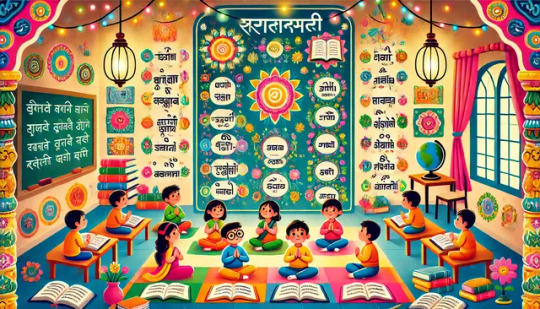
0 notes
Text
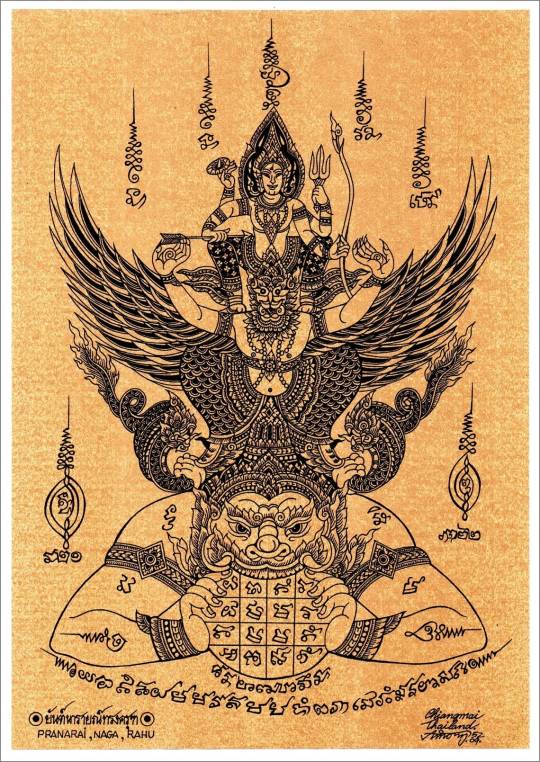
Lord Vishnu & Garuda Thai art
Lord Garuda Mantra Garuda Gayatri Mantra:
Om Thathpurushaya Vidhmahe Suvarna Pakshaya Dheemahe Thanno Garuda Prachodayath
Meaning: I offer my salutations to the great living being, Oh, the bird with golden wings, bless me with higher intellect and let the Lord Garuda illuminate my mind.
20 notes
·
View notes